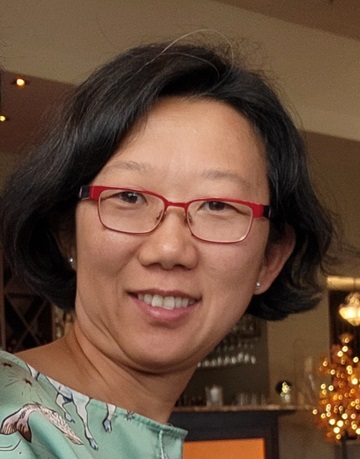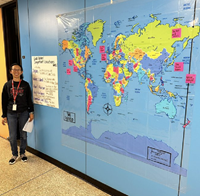 Emy Tomita
Emy Tomita
District Bilingual Literacy Coach, Aldine Independent School District, Houston, TX
How did you begin your career, and what led you to your current position?
I began my teaching career as a fourth-grade bilingual teacher in the suburbs of Houston. I taught language arts and social studies within different bilingual program models (transitional, one-way, and two-way dual language) for eight years. Then I moved to the middle school level and worked as a librarian and language arts special education teacher before I accepted a position as a bilingual literacy coach.
What is the biggest challenge in your current role?
My biggest challenge in my current role is to work with classroom teachers to de-implement ineffective literacy practices, but also continue building teachers’ capacity on how to teach literacy through a content-based curriculum.
What are you reading (personal or professional)?
I am reading many Reading Teacher articles related to multilingual learners, dual language education, and the science of reading. The last article that I read was “The Science of Reading Progresses: Communicating Advances Beyond the Simple View of Reading” by Nell K. Duke and Kelly B. Cartwright. I am also listening to the book Atomic Habits: An Easy & Proven Way to Build Good Habits & Break Bad Ones by James Clear during my commute to work. Lastly, I am reading Culturally Responsive Teaching and the Brain: Promoting Authentic Engagement and Rigor Among Culturally and Linguistically Diverse Students by Zaretta Hammond with other literacy coaches in my school district.
How long have you been a member of ILA, and how has membership influenced your career?
I had been an ILA member on and off for several years when I was a classroom teacher. This last time, I have been a member since 2021 because having the membership allowed me to have access to all the literacy research articles and best teaching practices that make a positive impact in my career.
What do you consider to be your proudest career moment?
My proudest career moment as a bilingual teacher was to present about the use of mentor texts to support emergent bilingual students’ writing development at the Texas Association of Bilingual Education conference. As a literacy coach, my proposal to present about implementing realia to make content-based curriculum accessible to multilingual learners was accepted in the National Association of Bilingual Education Conference.
What do you like to do when you’re not wearing your educator hat?
When I am not wearing my educator hat, I like to travel to different places, read free-choice books, attend literacy conferences, attend literacy events with my daughter, and just be a learner.
What advice would you give a new teacher that either you received or wish you had?
Not to give up this profession in your first year of teaching because it is one of the hardest.
What is a little-known fact about yourself?
That I was born in Brazil and my grandparents on both sides, mother and father, are Japanese. So, I don’t look like a typical Brazilian. My first language is Portuguese. Brazil has the largest number of Japanese descendants out of Japan.
What can literacy educators do to motivate kids to want to read?
Literacy educators can help kids to learn what they like to read and allow them to read what they like to read in class. They create the habit of reading, and if teachers model to them how to think and talk about book with friends like in book clubs, this will motivate kids to be a reader for life.
What do you believe is the biggest challenge in literacy education today?
 The increasing number of book bans because books are “mirrors and windows” for readers. Kids need to have access to all types of books so they can see themselves and feel the sense of belonging, but also, they need to access diverse books and different topics so they can accept others and learn from others who are different from them.
The increasing number of book bans because books are “mirrors and windows” for readers. Kids need to have access to all types of books so they can see themselves and feel the sense of belonging, but also, they need to access diverse books and different topics so they can accept others and learn from others who are different from them.
When did you know you wanted to become a teacher?
I knew I wanted to become a teacher when I was in sixth grade because I loved reading books and my language arts teacher.
Who was your favorite teacher when you were growing up, and why?
My favorite teacher when I was growing up was Ms. Sylvia because she was knowledgeable, fair, and had high expectations.
Which professional development books have you found influential in your education?
There are so many professional development books that I found influential in my education. In bilingual education, Biliteracy From the Start: Literacy Squared in Action by Kathy Escamilla, Susan Hopewell, Sandra Butvilofsky, Wendy Sparrow, Lucinda Soltero-Gonzalez, Olivia Ruiz-Figueroa, and Manuel Escamilla and Teaching for Biliteracy: Strengthening Bridges Between Languages by Karen Beeman and Cheryl Urow. In literacy, Jennifer Serravallo’s books taught me strategy ideas to become a better reading and writing teacher.
What is the most important lesson you learned from a student?
The value of perseverance and hard work, especially from undocumented students. Even though they face many adversities, their drive to succeed by learning a new language and their effort is admirable.
What is your favorite book to give as a present/recommend to friends?
My favorite book to give as present/recommend to friends is Educated: A Memoir by Tara Westover because, in my opinion, this book shows the power of education and how it can transform a person’s life.
What book hooked you as a reader for life?
In my home country, a book series that hooked me as a reader for life is The Adventure of the Fat Boy’s Gang (As Aventuras da Turma do Gordo) by Joao Carlos Marinho because this book series kept me hooked months after months until I read the whole collection. Due to this series, I also started reading books in English when I came to the U.S.
Which hosting city of an IRA/ILA annual conference did you most enjoy visiting and why, or what are some of your favorite moments from an IRA/ILA annual conference?
The hosting city of the ILA annual conference that I enjoyed visiting the most was Boston because it was my first time attending this conference, and I remember how impressed I was with the quality of this conference. During this conference, I bought my first ILA shirt.
What has changed the most in education since you first started in the field?
What has changed the most in education since I started is the use of technology in schools, mostly due to the pandemic. While many schools had technology, I believe teachers and students were not so dependent on electronic devices before the pandemic.
Want to spotlight an ILA member, chapter, affiliate, SIG, or AUA? Email literacytoday@reading.org for more information!
Disclaimer: The viewpoints expressed in blog posts on this website are those of the individual writers and do not necessarily reflect the views of ILA. We have taken reasonable steps to ensure the accuracy of the information contained in blog posts but do not warrant the accuracy or completeness of such information.